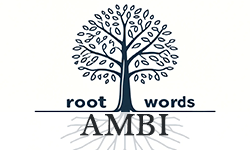
Root words are the core of many words, helping you unlock their meanings. They’re like clues hidden in plain sight that, once understood, can drastically expand and improve your vocabulary. By exploring root words, you tap into the essence of language and its rich history. For example, the root “ambi,” meaning “both,” shows up in various words, hinting at the idea of duality or two sides. This article will guide you through the words that stem from this root.
Definition: Ambi
The prefix “ambi-” is a Latin-derived element used in English to signify “both” or “on both sides.” It is commonly attached to words to indicate the presence of two aspects, qualities, or directions. This root word is commonly used to convey a sense of duality or encompassing both sides of a situation. It can be found in adjectives, nouns, or adverbs.
Origin
The origin of “ambi-” traces back to Latin, where it means “both” or “around.” It is a versatile prefix used to modify adjectives, nouns, and adverbs, enriching the English language with words that convey complexity and multiplicity in one term.
Take “ambidextrous,” for example, which means you can use both hands just as well, or “ambiguous,” when something can mean more than one thing. Then there’s “ambivalent,” which is when you’re torn about how you feel about someone or something. This root has maintained its original sense from Latin, consistently conveying the idea of twofold or dual characteristics.
Using “ambi” in nouns
In linguistics, “ambi” is used to denote concepts involving two aspects, such as “ambivert,” referring to a person who has equal characteristics of being introverted and extroverted. When “ambi” is used in nouns, it typically denotes things or concepts that embody the idea of both sides. Examples of nouns incorporating “ambi” are illustrated below.
Ambivalence…
… describes the state of having mixed or contradictory ideas or feelings about something/someone.
Ambivert…
… describes a person whose personality has a balance of extrovert and introvert features.
Ambiguity…
… is the quality of being open to more than only one interpretation. This term also refers to “inexactness.”
Further nouns with “ambi”
| Example | Explanation |
| Ambidexterity | The ability to use both hands equally well. |
| Ambience | The atmosphere or mood of a place. |
| Ambigram | A design readable in multiple orientations. |
| Ambit | It refers to the scope of something used in a figurative sense. |
| Ambitendency | The presence of conflicting or opposing tendencies or inclinations. |
| Ambition | A strong desire to achieve something. |
Using “ambi” in adjectives
In adjectives, however, it typically describes qualities or characteristics involving both sides or dual aspects.
Ambitious…
… is an adjective to describe someone who has a strong desire and determination to succeed.
Ambivalent…
… describes the state of having mixed feelings or contradictory ideas about something/someone.
Ambidextrous…
… describes a person who can use both hands equally well.
Further adjectives with “ambi”
| Example | Explanation |
| Ambient | Relating to the immediate surroundings of something. |
| Ambiguous | Open to more than one interpretation; unclear. |
| Ambilateral | Affecting both sides of the body or an organ. |
| Ambiparous | Characterizing plants with rudiments of both flowers and leaves. |
| Ambisinister | Being unskilled with both hands; the opposite of ambidextrous. |
| Ambisyllabic | Describing a consonant that is shared phonetically by two adjacent syllables. |
Using “ambi” in adverbs
Adverbs starting directly with “ambi-” are not common in English. The prefix primarily forms nouns and adjectives to convey concepts related to both sides. However, one could theoretically extend “ambi-” to create adverbs in a descriptive or creative sense, such as “ambidextrously,” to describe performing an action with skill on both sides or with both hands.
Ambiguously…
… means in a way that is unclear or capable of being understood in more than one way.
Ambitiously…
… describes the manner in which something is done with a strong desire to achieve success.
Further adverbs with “ambi”
| Example | Explanation |
| Ambidextrously | Performing a task with equal skill or proficiency using either hand. |
| Ambivalently | Acting or feeling with mixed emotions or uncertainty. |
FAQs
Yes, “ambi-” is a Latin-derived prefix meaning “both,” or “on both sides.”
Here are some examples:
- Ambivalent
- Ambivert
- Ambiguity
- Ambitious
- Ambidexterity
The root “ambi” is derived from Latin. However, the Greek equivalent is “amphi.”
In the biological context, “ambi” refers to organisms or anatomical structures that have characteristics or functions applicable to both sides of the body or two different environments.
- ✓ Free express delivery
- ✓ Individual embossing
- ✓ Selection of high-quality bindings
